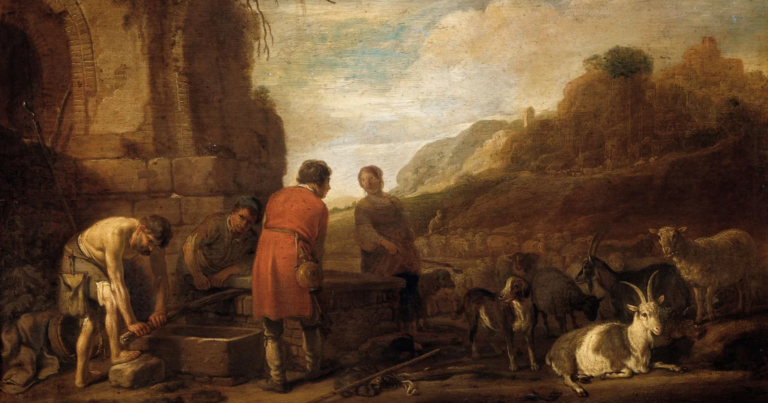“For I desire mercy, not sacrifice, and acknowledgment of God rather than burnt offerings.”
Hosea 6:6
The Book of Prophet Hosea offers profound insights for those seeking a deeper spiritual life.
Its central messages—redemption, love, and the importance of true worship—resonate through the ages, providing guidance for personal transformation.
Hosea’s call to return to God with sincere hearts challenges us to examine our own lives and relationships.
In this exploration, we’ll delve into Hosea’s poignant teachings to uncover actionable wisdom for nurturing our faith and fostering spiritual growth.
Who is Prophet Hosea?
Hosea is the first of the twelve prophets in the Book of the Twelve.
The Book of the Twelve Prophets was originally on one parchment roll because of the brevity of the text, and together formed one Book of the 24 Books of Hebrew Scripture.
These twelve prophets were sometimes named the minor prophets, not because they are of lesser importance, but because their writings are brief.
The Twelve include: Hosea, Joel, Amos, Obadiah, Jonah, Micah, Nahum, Habakkuk, Zephaniah, Haggai, Zechariah, and Malachi.
Positioned at the outset of the twelve minor prophets, Hosea’s writings are a cornerstone in understanding Israel’s spiritual decline and God’s enduring love.
The brevity of his text, combined with eleven others, originally formed a singular scroll within the Hebrew Scripture. These prophets, though termed ‘minor’, are not of lesser significance but are so called due to the succinctness of their writings.
Hosea’s ministry took place against the backdrop of the Northern Kingdom during Jeroboam II’s reign in the eighth century BC.
His personal experiences, particularly his troubled marriage to Gomer, deeply paralleled Israel’s unfaithfulness to God—marked by rampant idolatry and social injustices.
Hosea’s prophetic message
Embedded within the collection of the twelve minor prophets, the Book of Prophet Hosea stands out with its unique blend of personal narrative and divine prophecy.
It addresses the Northern Kingdom’s infidelity to God through the metaphor of Hosea’s own tumultuous marriage.
Composed in the turbulent 8th century BC, Hosea’s writings are brief yet powerful, echoing the themes of sin, judgment, and restoration.
Simply put, the text reveals Hosea as a deeply emotional man who mirrors Israel’s spiritual adultery with vivid imagery and passionate pleas for repentance.
His prophecies foreshadowed the Assyrian conquest in 722 BC while offering a glimmer of hope for future reconciliation.
Before we discuss his lessons for modern Christians, let’s take a look at the story of Israel’s spiritual adultery.
Israel’s infidelity
The Book of Hosea starkly portrays Israel’s infidelity through the lens of spiritual adultery.
The nation, having turned to other gods and engaged in oppressive practices, is depicted as a spouse who has broken the bonds of marriage.
Hosea uses the imagery of his own wife’s unfaithfulness to parallel Israel’s betrayal of their covenant with God.
- Idolatry: Israel’s worship of false gods is likened to Gomer seeking other lovers, an act that undermines the exclusivity of her marriage vows.
- Social injustice: The oppression of the poor and vulnerable within Israel is seen as a direct contravention of God’s commandments, further severing their relationship with Him.
The names Hosea gives to his children with Gomer are symbolic indictments of Israel’s actions:
- Jezreel — alludes to bloodshed and coming retribution;
- Lo-Ruhamah — indicates the withdrawal of God’s compassion;
- Lo-Ammi —a name that literally means “not my people,” signifying a severed relationship.
These names are prophetic markers of Israel’s spiritual stat e —lost, unloved, and unacknowledged by God because of their choices.
Hosea’s message is clear: Israel must recognize its unfaithfulness and the inevitable consequences that come with it.
6 lessons from Hosea for modern Christians
1. Unconditional love is powerful
“I will heal their waywardness and love them freely, for my anger has turned away from them.”
Hosea 14:4
Hosea’s story is a powerful testament to God’s unconditional love.
Through Hosea’s own marriage to Gomer, we see a reflection of how God loves us despite our flaws and failures.
Just think about it. Hosea’s love for Gomer, even when she is unfaithful, mirrors God’s unwavering commitment to His people, no matter how far they stray.
As a result, this narrative invites modern Christians to grasp the depth of God’s love for each of us:
A love that doesn’t depend on our perfection but embraces us in our imperfections. It challenges us to love others with the same patience and forgiveness, transforming our relationships and communities.
2. We shouldn’t neglect spiritual life
While Hosea’s message is underpinned by hope, it also includes a counter-intuitive twist:
The idea that neglecting knowledge of God can lead to destruction.
In simple terms, Hosea suggests that ignorance isn’t bliss. Rather, it can be fatal to spiritual life.
The book confronts readers with the consequences of forsaking wisdom and understanding, urging a proactive pursuit of spiritual knowledge as essential for survival and growth.
Think about it: when Israel turned away from God, their world began to unravel.
This isn’t just about ancient history — it’s a clear signal to us that when we put our faith on the back burner, we risk losing our way.
The story urges us to keep our spiritual health in check, constantly nurturing our relationship with God.
After all, staying connected with our faith isn’t just beneficial. It’s crucial for navigating life’s ups and downs.
3. There’s always room for a comeback through repentance
Even when the going gets tough and we’ve strayed far off course, Hosea hands us a beacon of hope:
Repentance and renewal are not just possible. They’re within reach.
Imagine a relationship so strong that no matter the betrayal, a sincere apology can mend the rift. That’s the picture Hosea paints of our bond with God.
Despite Israel’s wandering heart, their genuine return to God sparks a promise of healing and prosperity—think blossoming deserts and skies pouring rain.
So, is turning things around really doable?
Hosea says yes. He shows us an Israel lost in the weeds of wrongdoing but tells us that with true remorse and a commitment to change, a fresh start is on the table.
It’s a call to each of us to examine our paths, recognize our missteps, and embrace the power of repentance. And let’s admit it: it’s never too late to make a U-turn back to God’s open arms.
4. Faithlessness hurts like a broken marriage
Hosea’s personal life serves as a raw and vivid metaphor for Israel’s broken relationship with God.
The prophet marries Gomer, a woman who is unfaithful, symbolizing Israel’s infidelity through idolatry and social injustice.
This parallel cuts to the heart, displaying the depth of betrayal and the emotional turmoil it causes.
This isn’t just about breaking rules — it’s about breaking hearts.
Hosea’s personal pain lays bare the emotional devastation of betrayal, showing us that turning away from God isn’t a mere misstep — it’s a deep, personal rupture in a relationship built on love and trust.
Through Hosea’s eyes, we see that our spiritual wanderings don’t just breach a contract; they grieve the heart of God.
It’s a powerful reminder of the seriousness of our faithfulness and the deep emotional foundations of our covenant with God.
5. We should embrace God’s mercy
Just as Hosea’s story doesn’t end with the heartbreak of marital betrayal, our story doesn’t end with our spiritual wanderings.
In the wake of faithlessness, there’s a powerful promise waiting for us: the promise of God’s mercy and forgiveness.
Imagine the relief of being welcomed back with open arms after you’ve hurt someone deeply.
That’s the kind of forgiveness God offers.
Hosea’s narrative shifts from the agony of betrayal to the hope of reconciliation, illustrating that no matter how far we stray, God is always ready to heal the relationship.
This transition from Hosea’s portrayal of deep emotional breach to the assurance of forgiveness underscores a profound truth: our mistakes and failings, while serious, are not the final word.
God’s readiness to forgive is rooted in His deep love for us — a love that can restore the most broken bonds and breathe life into the driest deserts of our souls.
6. Life can triumph over death
In a world where loss and despair can sometimes feel insurmountable, Hosea offers a beacon of hope that shines brightly against the darkest backdrop.
The victory of life over death isn’t just a lofty ideal — it’s a promise woven into the fabric of Hosea’s message and echoed throughout the scriptures.
This promise reaches its crescendo in the New Testament, where Hosea’s words are called upon to herald Christ’s resurrection, the ultimate victory over death.
The truth is taht in the grand narrative of faith, death does not have the final say. The cycles of loss and revival in Hosea’s time foreshadow the resurrection, offering us a glimpse into God’s master plan where life always emerges victorious.
It’s a stark reminder that our darkest moments are never the end of the story.
There’s a resurrection morning for every Good Friday we face, a beacon of hope that life, with all its beauty and complexity, triumphs in the end.
Not surprisingly, this victory is not just a future event but a present reality, inviting us to live in the light of resurrection hope every day.
Can hearts be restored?
“Take with you words, and turn to the LORD: say unto him, Take away all iniquity, and receive us graciously.”
Hosea 14:2
Amidst the tumult of Hosea’s narrative lies a piercing question: Can hearts be restored after such deep transgressions?
Hosea’s message is one of relentless hope.
He implores Israel to return to the Lord with words of repentance and humility.
The significance of this plea is timeless—acknowledging wrongdoing and seeking forgiveness are steps toward healing and reconciliation.
Here’s the thing:
The prophet’s call to return emphasizes that restoration is not only about divine mercy but also human responsibility.
Consider it a two-way relationship, where grace meets genuine contrition, and where renewed hearts can once again flourish under God’s compassionate care.
Conclusion: Applying Hosea’s wisdom
As we reach the culmination of our journey through the Book of Prophet Hosea, we are reminded of the transformative power of God’s word in our lives.
Those seeking deeper insights from Hosea are often looking for ways to apply these ancient truths to their contemporary spiritual walk.
The call to repentance, a central theme in Hosea, invites us to examine our own lives for areas where we may have strayed from God’s path.
It encourages a heartfelt return to the Lord, assuring us of His readiness to forgive and heal. Embrace the lessons of Hosea by:
- Reflecting on personal instances of spiritual infidelity and the need for genuine repentance.
- Recognizing God’s steadfast love in your life, even when you face discipline or correction.
- Seeking to understand the broader societal implications of Hosea’s message, such as social justice and care for the marginalized.
Let Hosea’s enduring words guide you toward spiritual rejuvenation. Along the way, don’t forget to grow in understanding and embody the love and righteousness that God desires for each of His children.











